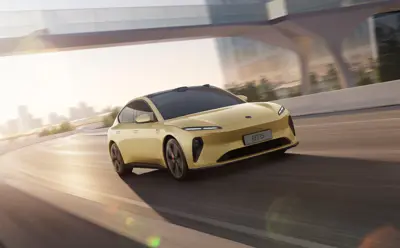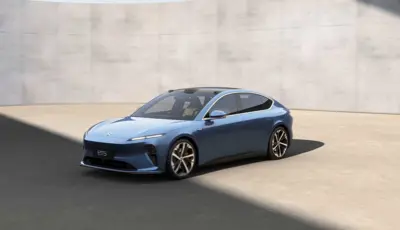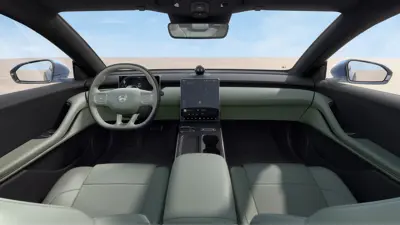Nio ET5

Nio ET5 is an all-electric sedan offering a WLTP range of up to 590 km (367 miles). EVKX.net has all the details you need.
Nio ET5
We've organized this article into specific sections for easier navigation. Click the links below to jump to different areas or read on for the full article. Additionally, we offer an overview of the full specifications, an image gallery, detailed information about charging performance, and some online reviews. Our sections include:
Performance
The Nio ET5 packs an impressive punch with a maximum power of 480 kW (653 hp / 644 bhp) and a commanding total torque of 850 Nm (627 lb-ft). This high-performance machine can sprint from 0 to 100 km/h (0 to 62 mph) in just 3.9 seconds, and it reaches a top speed of 200 km/h (124 mph), making it a standout in its class.
Battery, Range, and Charging
The Nio ET5 is available with two battery options, each offering different specifications and performance metrics.
100kWh
The high-capacity battery has a gross capacity of 100.0 kWh and a net usable capacity of 90.0 kWh, providing a 10.0 kWh buffer (10.0%) for battery protection. With a nominal voltage of 358 volts, the system is classified as a 400-volt battery system, aligning with industry standards.
Under the WLTP (Worldwide Harmonized Light Vehicles Test Procedure) standard, the vehicle's range varies between 590 to 540 km (367-336 miles), depending on the specific configuration and options, such as wheel size. Larger wheels can increase energy consumption and subsequently reduce the overall range.
The vehicle's energy consumption is rated at 15.3 kWh/100 km for the base model and 16.7 kWh/100 km for the top-tier model under the WLTP test cycle.
For more details about the range, see real-world data and range listings on this model’s range and consumption page.
The vehicle supports fast DC charging with a maximum power of 126 kW. Charging from 0% to 100% takes approximately 77 minutes, while a typical 10% to 80% charge takes about 42 minutes with an average charging speed of 89 kW.
Considering an additional 5 minutes for each charging stop due to driving interruptions, the optimal charging range is from 1% to 43%. This results in an effective charging speed, including time lost, of 84 kW, with each charging session taking about 27 minutes and 52 seconds.
In a 1000 km challenge at a constant speed of 120 km/h (75 mph) with an assumed consumption rate of 23 kWh/100 km, the trip would take about 9 hours and 59 minutes, needing four charging stops from 1% to 40%, totaling 100 minutes of charging time.
75kWh
The high-capacity battery has a gross capacity of 75.0 kWh and a net usable capacity of 70.5 kWh, providing a 4.5 kWh buffer (6.0%) for battery protection. With a nominal voltage of 386 volts, the system is classified as a 400-volt battery system, aligning with industry standards.
Under the WLTP (Worldwide Harmonized Light Vehicles Test Procedure) standard, the vehicle's range varies between 456 to 419 km (283-260 miles), depending on the specific configuration and options, such as wheel size. Larger wheels can increase energy consumption and subsequently reduce the overall range.
The vehicle's energy consumption is rated at 15.3 kWh/100 km for the base model and 16.7 kWh/100 km for the top-tier model under the WLTP test cycle.
For more details about the range, see real-world data and range listings on this model’s range and consumption page.
The vehicle supports fast DC charging with a maximum power of 140 kW. Charging from 0% to 100% takes approximately 66 minutes, while a typical 10% to 80% charge takes about 35 minutes with an average charging speed of 85 kW.
Considering an additional 5 minutes for each charging stop due to driving interruptions, the optimal charging range is from 7% to 74%. This results in an effective charging speed, including time lost, of 75 kW, with each charging session taking about 38 minutes and 39 seconds.
In a 1000 km challenge at a constant speed of 120 km/h (75 mph) with an assumed consumption rate of 23 kWh/100 km, the trip would take about 10 hours and 29 minutes, needing four charging stops from 8% to 65%, totaling 129 minutes of charging time.
Onboard Charger
The standard onboard charger supports up to 11 kW for Level 1 and Level 2 AC charging, allowing a full 0–100% charge in about 8 hours and 10 minutes with a standard home setup.
Charge Port
The charge port is located on the left rear side, making it easy to use charge stations where you need to back up into the charger.
Connector types vary by market: this model uses CCS Combo 1 in North America and CCS Combo 2 in Europe. For complete specifications for all markets, refer to the full specifications.
Drivetrain
The Nio ET5 features an all-wheel drive system powered by two motors, one on each axle.
The motors used are Induction Motors at the front axle and Permanent Magnet Synchronous Motors at the rear axle.
Suspension
The Nio ET5 features a multilink front and rear suspension, both equipped with monotube dampers and coil springs for a balanced and comfortable ride.
Steering
Progressive steering is standard on the Nio ET5, automatically adjusting the steering ratio based on speed for improved control and comfort.
Brakes
The Nio ET5 is equipped with cast-iron disc brakes on both the front and rear.
Regenerative Braking
Automatic regeneration is not available in this model. However, regenerative braking is available through one-pedal driving combined with blended brakes.
At low speeds, the one-pedal drive mode will keep the car creeping forward.Drivers can also adjust the regenerative braking strength when lifting off the accelerator. There are three levels of regenerative braking to choose from, allowing you to customize the driving experience to your preference.
Exterior
The Nio ET5, with dimensions of 4790 mm in length, 1960 mm in width, and 1499 mm in height, falls into D-segment cars, also known as mid-size or family cars, offer more space, comfort, and features than smaller segments, making them suitable for a variety of drivers.
The Nio ET5 is available in a total of 10 solid paint colors.
The Nio ET5 offers multiple wheel options in different sizes, allowing you to customize your vehicle to suit your style and driving preferences. The available tire and wheel combinations include:
- 255/50 tires on 20" rims
- 255/45 tires on 21" rims
Narrower wheels improve consumption and provide a longer range, while wider wheels offer better traction and handling.
The car has four regular doors and a liftgate, which makes the trunk much more usable compared to a traditional bootlid, especially for a sedan.
Soft close is common.standardfeature function for the side doors.
The liftgate is electric-powered and has a kick-sensor as standard.
There is only one roof option for this model.
The standard roof includes a large panoramic glass roof extending from the front to the rear, enhancing the interior's spacious and bright feel, thereby improving the mood and comfort of occupants. This glass is tinted to protect against heat from the sun.
Nio ET5
Interior
Seats
The Nio ET5 accommodates five passengers with two front seats and a three-seat bench in the rear.
First Row Seats
The Nio ET5 offers a single type of front seat.
The following functionalities are available on the standard seat:
- Fore-and-aft adjustment (electrically adjustable)
- Recline adjustment (electrically adjustable)
- Height adjustable headrest
- Heating
- Memory
- Adjustable lumbar support (electrically adjustable)
- Adjustable thigh support
- Ventilation
- Massage
- Footrest for passenger (standard for passenger seat)
Available in:
- Black leatherette upholstering
- Brown leatherette upholstering
- Gray leatherette upholstering
Second Row Seat
The second row features a standard three-seat bench with a 60:40 split, allowing each section to fold separately to increase cargo space.
Additional functionalities include:
- Heating (standard for outer seats)
Climate System
There is one climate system available:
- 3-zone climate system: Supports different temperatures in three zones for the driver, passenger, and backseat.
Comfort Features
The Nio ET5 includes several features to enhance comfort and convenience:
- Electrically Adjustable Steering Wheel
- Wireless Phone Charging
User Interface and Control
This model features a dual-screen layout, separating key driver information from infotainment and vehicle controls for a more structured user experience.
Key screen details:
- Driver Information Display: A 10.2-inch screen mounted directly on the dashboard behind the steering wheel. This compact display shows essential driving information such as speed, range, and navigation prompts.
- Center Console Touchscreen: A 12.3-inch touchscreen located in the center console. It serves as the primary interface for infotainment, navigation, climate control, and vehicle configuration.
The Nio ET5 does not include a head-up display, so driving information such as speed and navigation cues is not projected into the driver’s line of sight on the windshield.
Nio ET5
Steering Wheel
The Nio ET5 is equipped with a single type of steering wheel:
- Circular Steering Wheel: This steering wheel provides intuitive control over the infotainment system, allowing you to easily adjust the volume, change music tracks, and manage other key functions.
Mirrors
Both the exterior and interior mirrors use conventional mirror technology to provide a clear view of the area behind the vehicle.
This model has an optional voice control system. The voice control lets you control some functionality through voice commands.
Infotainment
Navigation System
With the common.standardfeature in-car navigation system, you have all the assistance you need to reach your destination effortlessly.
Sound System
The Nio ET5 comes equipped with one sound system option:
- Premium sound system: Features en 23 speakers.
Additionally, the model includes 2 USB-C connections as standard.The model has 1 USB-A connections as standard.
Mobile App
The Nio ET5 comes with a dedicated mobile app, available for both Android and iOS devices, allowing you to manage and monitor your vehicle remotely. The app offers a wide range of features designed to enhance your driving experience:
Lights
Standard Headlights: These use advanced LED technology, providing bright and efficient illumination.
The taillights use LED technology, ensuring both high visibility and energy efficiency.
Advanced Driver Assistance Systems
The Nio ET5 features a range of standard and optional advanced driver assistance systems (ADAS) designed to enhance safety and comfort.
Safety Systems
Anti-lock Braking System (ABS): Standard on the Nio ET5, this system prevents the wheels from locking during braking.
Electronic Stability Control (ESC): Standard on the Nio ET5, this system improves the vehicle's stability and handling during sudden maneuvers or on slippery road conditions.
Lane-Keeping Assist (LKA): Standard on the Nio ET5, this system helps prevent the vehicle from drifting out of its lane.
It also includes a Lane Departure Warning system to alert the driver if the vehicle veers out of the lane.
Front Cross Traffic Assist (FCTA) : Optional on the Nio ET5, this driver assist system that helps drivers detect oncoming traffic when crossing an intersection or turning left or right from a stopped position.
Rear Cross Traffic Alert (RCTA): Standard on the Nio ET5, this system uses sensors to detect approaching vehicles from the side when backing out of a parking space or driveway.
Forward Collision Warning (FCW): Optional on the Nio ET5, this driver assist system helps drivers avoid or mitigate frontal collisions.
Automatic Emergency Braking (AEB): Standard on the Nio ET5, this system autonomously applies the brakes to prevent or reduce the severity of a collision if the driver does not react in time.
Automatic Emergency Steering (AES): Optional on the Nio ET5, this system assists in avoiding collisions by automatically steering the vehicle in an emergency.
Blind-spot Monitoring (BSM) : Standard on the Nio ET5, this side assist system helps to detect traffic in blind spots.
Driving Automation
The Nio ET5 offers driving automation at levels 1 or 2, depending on the equipment level.
With the NIO Pilot Selected Pack level 1 system, you get the following driving automation features.
- Adaptive Cruise Control (ACC)
- Automatic parking. (optional)
With the optional NIO Pilot Complete Pack level 2 system, you get additional driving automation features to the ones listed above:
- Lane Centering Assist (LCA) /AutoSteer: keeps the car in your lane and slows down if needed in traffic. The system limits how long you can drive without touching the steering wheel.
- Advance cruise control that follows navigation and turns off and on major roads to reach the target.
Safety
Security and Access Technologies
The Nio ET5 is equipped with advanced security features to protect you and your vehicle. These include:
- Keyless Entry and Start: The vehicle's keyless entry and start system enables seamless access, allowing you to unlock and start the car without needing to remove the key from your pocket or bag.
Cargo Capacity and Towing Ability
The trunk offers a cargo capacity of 363 liters (12.8 CU FT).
On the roof, you can load up to 100 kg (220.5 lbs).
Optional roof rails are available for easy mounting of a roof box or rack.
The vehicle’s maximum weight is 2900 kg (6393 lbs), with a base weight of 2379 kg (5245 lbs). This allows for a maximum load of 521 kg (1149 lbs), including the driver and passengers. Note that some options may increase the base weight and reduce the maximum loading capacity.
A towbar can be added to the vehicle. The maximum permissible weight for a braked trailer is 2000 kg (4409 lbs), while for an unbraked trailer, it is 750 kg (1653 lbs).



